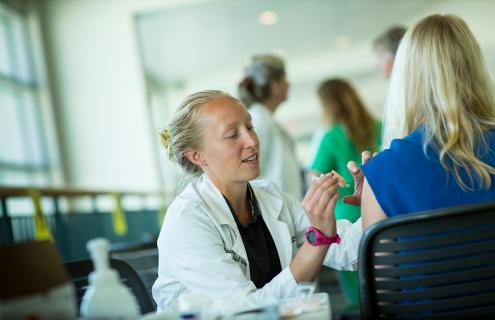
Before the COVID-19 pandemic, few generations understood the life-changing effects of vaccination. During the past 50 years, most children who received vaccines as part of their preventative healthcare didn’t witness the diseases they were being protected from, like smallpox, rubella and polio.
Today, people have had a front-row seat to the benefits of vaccines. "The COVID-19 vaccination is a major triumph against a disease that has a devastating impact," says Peter Wright, MD, Infectious Disease and International Health specialist at Dartmouth Health Children's.
Vaccinations serve two purposes—to protect the individual, and to limit the spread of infection within a population. When a large number of the population is vaccinated, the spread of viruses and bacteria can be interrupted. This helps establish "herd immunity," when a virus loses its effectiveness because the majority of the population is protected against it. Therefore, in protecting ourselves, we protect our community.
Recommended vaccines
Infants under the age of 2 and childhood boosters:
- Pertussis
- Tetanus
- Diphtheria
- Measles
- Mumps
- Rubella
- Polio
- Rotavirus
- Chickenpox
- Hemophilus influenzae
- Pneumococcus
- Hepatitis A and B
- Influenza – on an annual basis throughout childhood
- COVID 19 – available for children 6 months and up
Age 11 and up:
- Meningococcal
- Human papillomavirus (HPV)
Adults should vaccinate themselves against the following:
- Influenza (seasonal)
- COVID-19
- Pneumococcal
- Shingles
- Tetanus<
- Pertussis
- RSV
Additional vaccines may be recommended depending on a person's specific health condition, occupation or travel plans. Visit the Centers for Disease Control and Prevention website for more information about vaccines.
Vaccines are safe and the most effective tool in preventing disease. "Vaccines have a tremendous safety record. Their use has successfully eliminated diseases like measles, rubella, chicken pox, polio, diphtheria and whooping cough," says Wright. "People should trust the scientific and regulatory work that goes into developing and using them."
Today's vaccines are given to prevent more than just viral infections. The human papillomavirus (HPV) vaccine protects individuals from the virus and is the only vaccine that protects against cervical cancer in females and penile or rectal cancer in males.
"There are exciting developments and adaptations in the science that's been used in creating the COVID-19 vaccines that will help improve and advance the capabilities of future vaccines," says Wright.
Despite the safety and success of vaccination, the global rate of vaccination is declining in part due to the COVID-19 pandemic. Access to care, remote schooling and misinformation all contributed to this drop.
Vaccines and preventative care
A key partner in ensuring you and your family are up to date on all your vaccinations is your primary care provider. Mathew Mackwood, MD, a primary care provider at Dartmouth Hitchcock Clinics Heater Road, teaches medical students about patients and vaccine hesitancy. "Vaccines are one of—if not—the single most beneficial public health preventive measures we've ever invented," says Mackwood. "So it is one of the most important choices I discuss with my patients."
Vaccines are a standard practice during pediatric visits, but by adulthood, vaccinations can often be overlooked. Mackwood suggests that routine physical appointments are the perfect time to discuss with your provider which immunizations you may need with your provider.
"Patients should discuss any questions they have about immunizations (or vaccines, whichever you want to choose) with their primary care provider. Having an established relationship matters a lot in these conversations," says Mackwood. "Science can be hard to understand, especially when guidance is constantly changing and there is a lot of misinformation. Having your concerns addressed by someone you trust and who knows your history and beliefs is essential."
